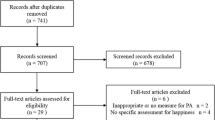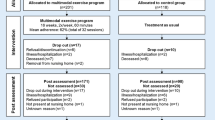Abstract
Purpose
Perceived cognitive impairment refers to cognitive dysfunction that particularly involves impairment in working or short-term memory, and inattention. This study aimed to identify factors associated with perceived cognitive impairment in patients with advanced lung cancer.
Methods
This cross-sectional analysis used pooled data from a prospective, ongoing randomized controlled trial examining the effectiveness of exercise in patients with advanced lung cancer (Trial Registration: NCT04119778). Patients diagnosed with stage IIIB or IV non-small cell lung cancer were recruited from three public hospitals in Hong Kong between December 2018 and December 2021. Demographics, daily step count, sleep quality, fatigue, depression, anxiety, and perceived cognitive impairment were included in the analyses. Multivariate logistic regression analysis was used to determine the most critical risk factors associated with perceived cognitive impairments in attention and memory.
Results
A total of 226 patients were included and analyzed, 35.4% of patients had perceived attention impairment and 58.4% had perceived memory impairment. The daily step count (adjusted odds ratio [aOR] = 0.496; confidence interval [CI] = 0.258–0.954), fatigue (aOR = 1.342; CI = 1.903–1.648), and anxiety (aOR = 1.179; CI = 1.042–1.335) were associated with a significantly increased risk of perceived attention impairment, while anxiety (aOR = 1.126; CI = 1.008–1.257) was identified as the most significant factor for perceived memory impairment.
Conclusion
The findings of this study can inform the design of effective interventions to reduce perceived cognitive impairment and promote the quality of life and well-being of patients with advanced lung cancer.
Similar content being viewed by others
References
Centre for Health Protection (2022) Lung cancer. https://www.chp.gov.hk/en/healthtopics/content/25/49.html. Accessed 27 Apr 2022
Sung H, Ferlay J, Siegel RL et al (2021) Global Cancer Statistics 2020: GLOBOCAN estimates of incidence and mortality worldwide for 36 cancers in 185 countries. CA Cancer J Clin 71:209–249
Crawford J, Denduluri N, Patt D et al (2020) Relative dose intensity of first-line chemotherapy and overall survival in patients with advanced non-small-cell lung cancer. Support Care Cancer 28:925–932
Barta JA, Powell CA, Wisnivesky JP (2019) Global epidemiology of lung cancer. Ann Glob Health 2019:85
Henneghan AM, Van Dyk K, Kaufmann T et al (2021) Measuring self-reported cancer-related cognitive impairment: recommendations from the Cancer Neuroscience Initiative Working Group. J Natl Cancer Inst 113:1625–1633
Bai L, Yu E (2021) A narrative review of risk factors and interventions for cancer-related cognitive impairment. Ann Transl Med 9:72
Lange M, Joly F, Vardy J et al (2019) Cancer-related cognitive impairment: an update on state of the art, detection, and management strategies in cancer survivors. Ann Oncol 30:1925–1940
Wefel JS, Vardy J, Ahles T, Schagen SB (2011) International Cognition and Cancer Task Force recommendations to harmonise studies of cognitive function in patients with cancer. Lancet Oncol 12:703–708
Eggen AC, Richard NM, Bosma I et al (2021) Factors associated with cognitive impairment and cognitive concerns in patients with metastatic non-small cell lung cancer. Neurooncol Pract 9:50–58
Ehrenstein JK, van Zon SKR, Duijts SFA et al (2022) Trajectories of cognitive symptoms and associated factors in cancer survivors after return to work: an 18-month longitudinal cohort study. J Cancer Surviv. https://doi.org/10.1007/s11764-022-01190-3
Lin CC, Chang WP (2017) Changes in the sleep-wake rhythm, sleep quality, mood, and quality of life of patients receiving treatment for lung cancer: a longitudinal study. J Clin Oncol 35:e21657–e21757
Mackenzie L, Marshall K (2022) Effective non-pharmacological interventions for cancer related cognitive impairment in adults (excluding central nervous system or head and neck cancer): systematic review and meta-analysis. Eur J Phys Rehabil Med 58(2):258–270. https://doi.org/10.23736/S1973-9087.21.06898-2
Schaffrath N, Oberste M, Zimmer P (2017) Effects of exercise interventions and physical activity behavior on cancer-related cognitive impairments: an update. Curr Opin Support Palliat Care 11:52–59
Shahid M, Kim J (2020) Exercise may affect metabolism in cancer-related cognitive impairment. Metabolites 10(9):377
Zimmer P, Baumann FT, Oberste M et al (2016) Effects of exercise interventions and physical activity behavior on cancer related cognitive impairments: a systematic review. Biomed Res Int 2016:1820954
Binarelli G, Joly F, Tron L, LefevreArbogast S, Lange M (2021) Management of cancer-related cognitive impairment: a systematic review of computerized cognitive stimulation and computerized physical activity. Cancers 13(20):5161
Zeng Y, Dong J, Huang M et al (2020) Nonpharmacological interventions for cancer-related cognitive impairment in adult cancer patients: a network meta-analysis. Int J Nurs Stud 104:103514
ECOG-ACRIN Cancer Research Group (2022) Eastern Cooperative Oncology Group Performance Status Scale. https://ecog-acrin.org/resources/ecog-performance-status/. Accessed 27 April 2022
Tsai PS, Wang SY, Wang MY et al (2005) Psychometric evaluation of the Chinese version of the Pittsburgh Sleep Quality Index (CPSQI) in primary insomnia and control subjects. Qual Life Res 14:1943–1952
Takemura N, Cheung DST, Smith R et al (2020) Effectiveness of aerobic exercise and mind-body exercise in cancer patients with poor sleep quality: a systematic review and meta-analysis of randomized controlled trials. Sleep Med Rev 53:101334
Wang XS, Hao XS, Wang Y et al (2004) Validation study of the Chinese version of the Brief Fatigue Inventory (BFI-C). J Pain Symptom Manage 27:322–332
Li Q, Lin Y, Hu C et al (2016) The Chinese version of hospital anxiety and depression scale: psychometric properties in Chinese cancer patients and their family caregivers. Eur J Oncol Nurs 25:16–23
EORTC Quality of Life Group (2022) Item Library. https://qol.eortc.org/item-library/. Accessed 7 March 2022
Campbell KL, Zadravec K, Bland KA, Chesley E, Wolf F, Janelsins MC (2020) The effect of exercise on cancer-related cognitive impairment and applications for physical therapy: systematic review of randomized controlled trials. Phys Ther 100:523–542
Isenberg-Grzeda E, Huband H, Lam H (2017) A review of cognitive screening tools in cancer. Curr Opin Support Palliat Care 11:24–31
Dorland HF, Abma FI, Roelen CAM et al (2016) The Cognitive Symptom Checklist-Work in cancer patients is related with work functioning, fatigue and depressive symptoms: a validation study. J Cancer Surviv 10:545–552
Eggen AC, Reyners AKL, Shen G et al (2020) Death anxiety in patients with metastatic non-small cell lung cancer with and without brain metastases. J Pain Symptom Manage 60:422–29.e1
Gu F, Li XF, Xu JF, Gao GH, Wu YF, Zhou CC (2018) Effect of nicotine dependence on quality of life and sleep quality in patients with lung cancer who continue to smoke after diagnosis. J Thorac Dis 10:2583–2589
Henneghan A (2016) Modifiable factors and cognitive dysfunction in breast cancer survivors: a mixed-method systematic review. Support Care Cancer 24:481–497
Myers JS, Erickson KI, Sereika SM, Bender CM (2018) Exercise as an intervention to mitigate decreased cognitive function from cancer and cancer treatment: an integrative review. Cancer Nurs 41:327–343
Acknowledgements
We would like to thank Dr. Tai Chung Lam, Dr. Tsz Yeung Kam, Dr. Inda Soong, and Dr. Yin Kwan Chik in the target settings for coordinating participant recruitment, and the participants for participating in the study.
Author information
Authors and Affiliations
Contributions
Conceptualization: Naomi Takemura, Mu-Hsing Ho, Denise Shuk Ting Cheung, Chia-Chin Lin.
Methodology: Naomi Takemura, Mu-Hsing Ho, Denise Shuk Ting Cheung, Chia-Chin Lin.
Formal analysis and investigation: Naomi Takemura, Mu-Hsing Ho.
Writing—original draft preparation: Naomi Takemura, Mu-Hsing Ho.
Writing—review and editing: Mu-Hsing Ho, Denise Shuk Ting Cheung, Chia-Chin Lin.
Supervision: Chia-Chin Lin.
All authors commented on previous versions of the manuscript. All authors read and approved the final manuscript.
Corresponding author
Ethics declarations
Ethics approval
This study was performed in line with the principles of the Declaration of Helsinki. Approval was granted by the University of Hong Kong/Hospital Authority Hong Kong West Cluster (approval number: UW 18–154), Hong Kong East Cluster (approval number: HKECREC-2019–014), and Kowloon Central Cluster/Kowloon East Cluster (approval number: KC/KE-19–0039/ER-3).
Consent to participate
Informed consent was obtained from all individual participants included in the study.
Consent for publication
Not applicable.
Competing interests
The authors declare no competing interests.
Additional information
Publisher's note
Springer Nature remains neutral with regard to jurisdictional claims in published maps and institutional affiliations.
Rights and permissions
Springer Nature or its licensor holds exclusive rights to this article under a publishing agreement with the author(s) or other rightsholder(s); author self-archiving of the accepted manuscript version of this article is solely governed by the terms of such publishing agreement and applicable law.
About this article
Cite this article
Takemura, N., Ho, MH., Cheung, D.S.T. et al. Factors associated with perceived cognitive impairment in patients with advanced lung cancer: a cross-sectional analysis. Support Care Cancer 30, 9607–9614 (2022). https://doi.org/10.1007/s00520-022-07377-9
Received:
Accepted:
Published:
Issue Date:
DOI: https://doi.org/10.1007/s00520-022-07377-9




